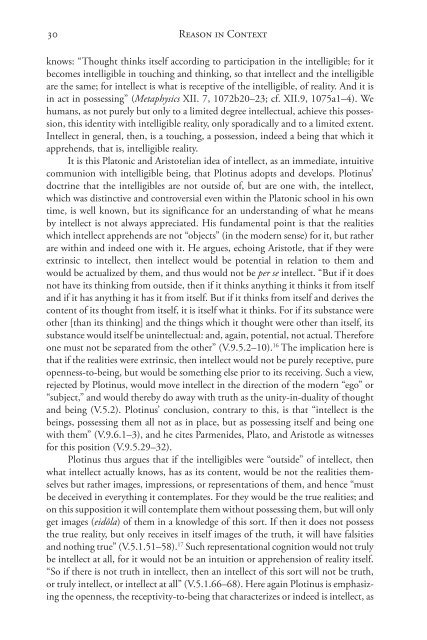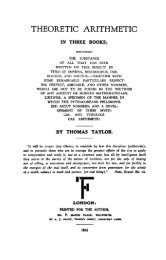Perl - The Good of the Intellect.pdf - Platonic Philosophy
Perl - The Good of the Intellect.pdf - Platonic Philosophy
Perl - The Good of the Intellect.pdf - Platonic Philosophy
Create successful ePaper yourself
Turn your PDF publications into a flip-book with our unique Google optimized e-Paper software.
30<br />
Reason in Context<br />
knows: “Thought thinks itself according to participation in <strong>the</strong> intelligible; for it<br />
becomes intelligible in touching and thinking, so that intellect and <strong>the</strong> intelligible<br />
are <strong>the</strong> same; for intellect is what is receptive <strong>of</strong> <strong>the</strong> intelligible, <strong>of</strong> reality. And it is<br />
in act in possessing” (Metaphysics XII. 7, 1072b20–23; cf. XII.9, 1075a1–4). We<br />
humans, as not purely but only to a limited degree intellectual, achieve this possession,<br />
this identity with intelligible reality, only sporadically and to a limited extent.<br />
<strong>Intellect</strong> in general, <strong>the</strong>n, is a touching, a possession, indeed a being that which it<br />
apprehends, that is, intelligible reality.<br />
It is this <strong>Platonic</strong> and Aristotelian idea <strong>of</strong> intellect, as an immediate, intuitive<br />
communion with intelligible being, that Plotinus adopts and develops. Plotinus’<br />
doctrine that <strong>the</strong> intelligibles are not outside <strong>of</strong>, but are one with, <strong>the</strong> intellect,<br />
which was distinctive and controversial even within <strong>the</strong> <strong>Platonic</strong> school in his own<br />
time, is well known, but its significance for an understanding <strong>of</strong> what he means<br />
by intellect is not always appreciated. His fundamental point is that <strong>the</strong> realities<br />
which intellect apprehends are not “objects” (in <strong>the</strong> modern sense) for it, but ra<strong>the</strong>r<br />
are within and indeed one with it. He argues, echoing Aristotle, that if <strong>the</strong>y were<br />
extrinsic to intellect, <strong>the</strong>n intellect would be potential in relation to <strong>the</strong>m and<br />
would be actualized by <strong>the</strong>m, and thus would not be per se intellect. “But if it does<br />
not have its thinking from outside, <strong>the</strong>n if it thinks anything it thinks it from itself<br />
and if it has anything it has it from itself. But if it thinks from itself and derives <strong>the</strong><br />
content <strong>of</strong> its thought from itself, it is itself what it thinks. For if its substance were<br />
o<strong>the</strong>r [than its thinking] and <strong>the</strong> things which it thought were o<strong>the</strong>r than itself, its<br />
substance would itself be unintellectual: and, again, potential, not actual. <strong>The</strong>refore<br />
one must not be separated from <strong>the</strong> o<strong>the</strong>r” (V.9.5.2–10). 16 <strong>The</strong> implication here is<br />
that if <strong>the</strong> realities were extrinsic, <strong>the</strong>n intellect would not be purely receptive, pure<br />
openness-to-being, but would be something else prior to its receiving. Such a view,<br />
rejected by Plotinus, would move intellect in <strong>the</strong> direction <strong>of</strong> <strong>the</strong> modern “ego” or<br />
“subject,” and would <strong>the</strong>reby do away with truth as <strong>the</strong> unity-in-duality <strong>of</strong> thought<br />
and being (V.5.2). Plotinus’ conclusion, contrary to this, is that “intellect is <strong>the</strong><br />
beings, possessing <strong>the</strong>m all not as in place, but as possessing itself and being one<br />
with <strong>the</strong>m” (V.9.6.1–3), and he cites Parmenides, Plato, and Aristotle as witnesses<br />
for this position (V.9.5.29–32).<br />
Plotinus thus argues that if <strong>the</strong> intelligibles were “outside” <strong>of</strong> intellect, <strong>the</strong>n<br />
what intellect actually knows, has as its content, would be not <strong>the</strong> realities <strong>the</strong>mselves<br />
but ra<strong>the</strong>r images, impressions, or representations <strong>of</strong> <strong>the</strong>m, and hence “must<br />
be deceived in everything it contemplates. For <strong>the</strong>y would be <strong>the</strong> true realities; and<br />
on this supposition it will contemplate <strong>the</strong>m without possessing <strong>the</strong>m, but will only<br />
get images (eidôla) <strong>of</strong> <strong>the</strong>m in a knowledge <strong>of</strong> this sort. If <strong>the</strong>n it does not possess<br />
<strong>the</strong> true reality, but only receives in itself images <strong>of</strong> <strong>the</strong> truth, it will have falsities<br />
and nothing true” (V.5.1.51–58). 17 Such representational cognition would not truly<br />
be intellect at all, for it would not be an intuition or apprehension <strong>of</strong> reality itself.<br />
“So if <strong>the</strong>re is not truth in intellect, <strong>the</strong>n an intellect <strong>of</strong> this sort will not be truth,<br />
or truly intellect, or intellect at all” (V.5.1.66–68). Here again Plotinus is emphasizing<br />
<strong>the</strong> openness, <strong>the</strong> receptivity-to-being that characterizes or indeed is intellect, as
















